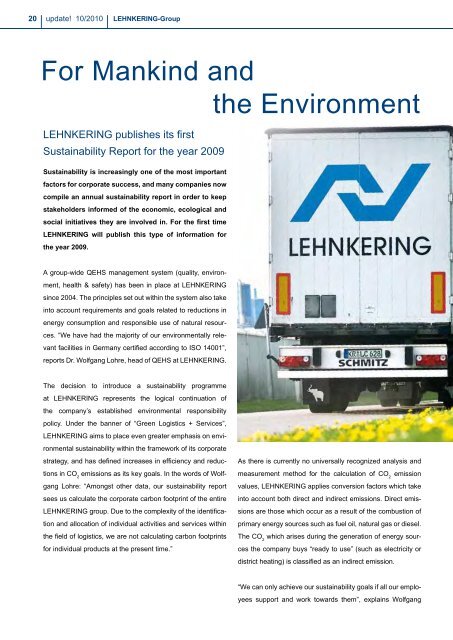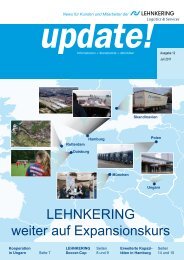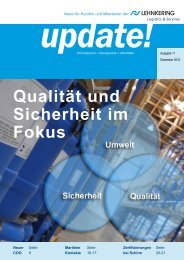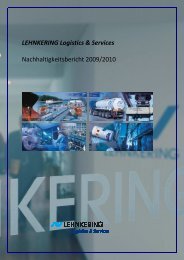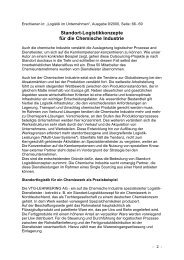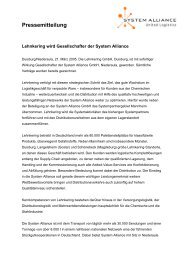update! - Lehnkering
update! - Lehnkering
update! - Lehnkering
You also want an ePaper? Increase the reach of your titles
YUMPU automatically turns print PDFs into web optimized ePapers that Google loves.
20 <strong>update</strong>! 10/2010 LEHNKERING-Group<br />
For Mankind and<br />
LEHNKERING publishes its first<br />
Sustainability Report for the year 2009<br />
Sustainability is increasingly one of the most important<br />
factors for corporate success, and many companies now<br />
compile an annual sustainability report in order to keep<br />
stakeholders informed of the economic, ecological and<br />
social initiatives they are involved in. For the first time<br />
LEHNKERING will publish this type of information for<br />
the year 2009.<br />
A group-wide QEHS management system (quality, environ-<br />
ment, health & safety) has been in place at LEHNKERING<br />
since 2004. The principles set out within the system also take<br />
into account requirements and goals related to reductions in<br />
energy consumption and responsible use of natural resources.<br />
“We have had the majority of our environmentally relevant<br />
facilities in Germany certified according to ISO 14001”,<br />
reports Dr. Wolfgang Lohre, head of QEHS at LEHNKERING.<br />
The decision to introduce a sustainability programme<br />
at LEHNKERING represents the logical continuation of<br />
the company’s established environmental responsibility<br />
policy. Under the banner of “Green Logistics + Services”,<br />
LEHNKERING aims to place even greater emphasis on environmental<br />
sustainability within the framework of its corporate<br />
strategy, and has defined increases in efficiency and reductions<br />
in CO emissions as its key goals. In the words of Wolf-<br />
2<br />
gang Lohre: “Amongst other data, our sustainability report<br />
sees us calculate the corporate carbon footprint of the entire<br />
LEHNKERING group. Due to the complexity of the identification<br />
and allocation of individual activities and services within<br />
the field of logistics, we are not calculating carbon footprints<br />
for individual products at the present time.”<br />
the Environment<br />
As there is currently no universally recognized analysis and<br />
measurement method for the calculation of CO emission<br />
2<br />
values, LEHNKERING applies conversion factors which take<br />
into account both direct and indirect emissions. Direct emissions<br />
are those which occur as a result of the combustion of<br />
primary energy sources such as fuel oil, natural gas or diesel.<br />
The CO which arises during the generation of energy sour-<br />
2<br />
ces the company buys “ready to use” (such as electricity or<br />
district heating) is classified as an indirect emission.<br />
“We can only achieve our sustainability goals if all our emplo-<br />
yees support and work towards them”, explains Wolfgang


